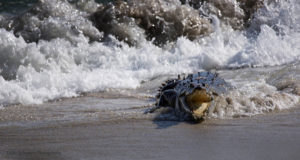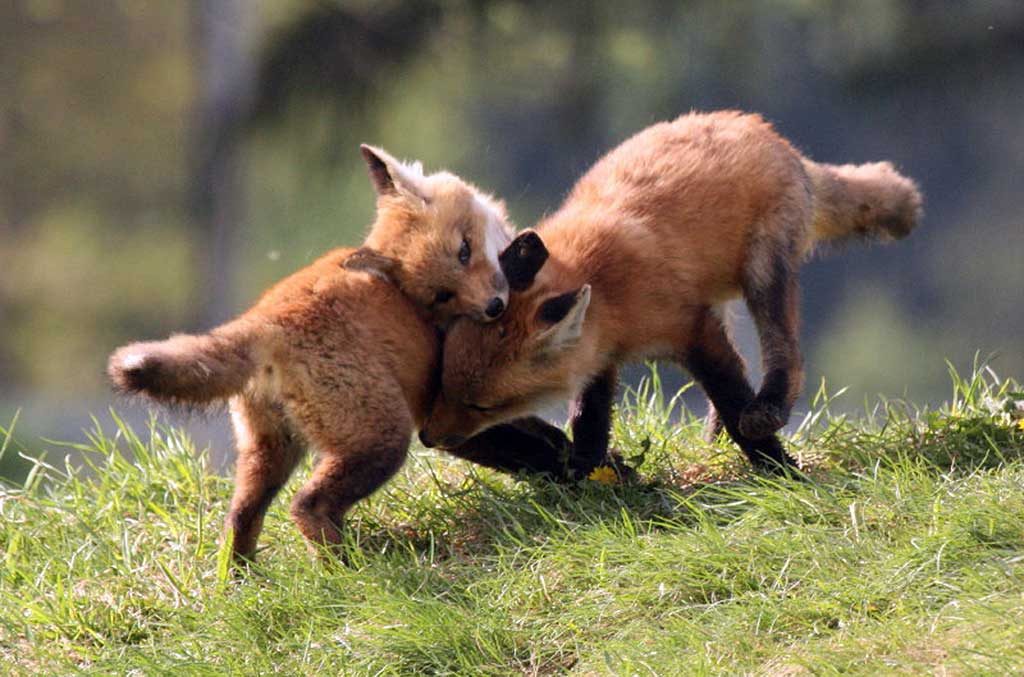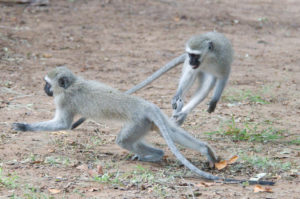Playing your brains out
Body-surfing monster waves in Australia; snowboarding down rooftops in Yellowknife on improvised boards; tobogganing into deliberate pileups at the bottom of steep hills—the range of unsupervised play that youngsters can get into is jaw-dropping. That’s not to mention the dangerous romping and horseplay, as well as rude games like spit-soccer in the pool. Honestly, they are such animals.
Biologists have long pondered why so many animal species evolved to play, occasionally at their peril. And to some extent, they are still wondering. Juvenile play in primates such as humans and apes is well-documented, and other mammals such as dogs and cats clearly play as well, but it turns out a surprising array of animals engage in frivolous games.
Writing for sciencenews.org in February 2015, Sarah Zielinski cites reptile-fun research from the University of Tennessee in Knoxville published that same month. Researchers Vladimir Dinets and Gordon Burghardt define animal play as any spontaneous activity having exaggerated (often repeated) motions, initiated by healthy animals in a stress-free environment. They describe a captive Nile soft-shell turtle which would “dribble” a basketball back and forth across the pool in its enclosure.

Photo: Eddiepics, Creative Commons, some rights reserved
The researchers apparently observed wild crocodiles body-surfing Down Under, and note that captive ones are keen on fooling around with plastic toys on both land and water. So much so that zoos now routinely provide their ’gators and crocs a variety of objects with which to amuse themselves. Anything that takes a crocodile’s mind off biting visitors is probably quite a good idea, anyway. Zielinski also mentions a biologist from the University of Lethbridge who observed octopuses spitting water for hours on end at floating objects to move them around their aquarium.
And to paraphrase the BBC’s Jason Goldman in his January 2013 report, “Gulls just wanna have fun.” He mentions a study done through the College of William and Mary in Williamsburg, VA which recorded young gulls playing “drop-catch” with various objects, especially on windy days when such a game was more challenging.
Ravens are game for a good time as well. Goldman highlights work done by University of Vermont biologists, who say it is “commonplace” to see ravens in northern Canada repeatedly sliding down rooftops, holding twigs in their talons as snowboards. To quote the researchers, “We see no obvious utilitarian function for [raven] sliding behaviour.”

Red fox kits playing near their den at the Crown Point Historic Site. Photo of the Day archive: Ellie George, Paradox Lake, NY
But play must have an evolutionary purpose, or animals would not do it. That seems to be the case, but not in the way we once assumed. There are endless nature documentaries online which show predators play-hunting, which supposedly made them better hunters, or play-fighting, which we thought improved their for-real fighting skills. Young goats and gazelles bounced around to improve their getaway odds, we once said. For some reason this all was so obvious that no one bothered with actual research for decades.
In her well-crafted and funny May 2011 article in Scientific American, biologist Lynda Sharpe writes about elephants filmed sliding, over and over, down a grassy hillside into their peers at the bottom, and asks: where is the evolutionary explanation for that? She spent five years researching meerkats, desert-dwelling carnivores, in the Kalahari. Her work found that those which engaged in the most play-fighting did not make better fighters, or attract mates faster. Likewise, meerkat cooperative play did not reduce aggression or improve social bonding. “So there you are. Five years and no answers. I simply cannot tell you why meerkats play,” she writes.
She also points out that long-overdue research has proved coyote play-hunting does not predict real hunting success, and the same for domestic cats. But, she concludes, “Play DOES help!”
Extra-playful individuals make better parents, rearing more young per litter. And play is necessary for learning. Rats, which reportedly are one of the most playful species, learn fastest when allowed to socialize and play normally. When a rat is given a diverse habitat with all kinds of cognitive stimulation (a rat equivalent of video games), but is deprived of play with others of its species, its brain fails to develop fully.

Monkeys at play. Photo: Chris Eason, Creative Commons, some rights reserved
Researcher Max Kerney, writing in Newsweek in June 2017, says “Studies of squirrels, wild horses and brown bears have confirmed that the amount of time animals spend playing when young does seem to have an important effect on their long-term survival and reproductive success. Exactly how play achieves this effect isn’t obvious.” But play goes well beyond that. More play means bigger brains.
Kerney’s team found “a close relationship between the amount that animals played and the size of their cortico-cerebellar systems,” which are involved in learning. He also cites earlier studies which “found relationships between [primate] play and the size of…the neocortex, cerebellum, amygdala, hypothalamus and striatum.” Voilà: all work and no play makes Jack stupid.
What does this all mean for our children, those young primates we hold so dear? There is a quote I like, though I can’t find its author, that goes (more or less) “Understanding rocket science is like children’s play compared to understanding children’s play.” Child’s play is so critical to proper development that The UN Convention on the Rights of the Child reads (in Article 31) “Children have the right to relax and play, and to join in a wide range of cultural, artistic and other recreational activities.”
It is important to point out that what grows young brains is the old-fashioned sort of goofing off—real-world, rough-and-tumble, tree-climbing, social play. Screen-time does not cut it, as the rat model illustrates.
In a Psychology Today blog post dated July 07, 2011, Marc Bekoff, professor emeritus of evolutionary biology at the University of Colorado, says “There are many reasons children need to play. Kids must be allowed to get dirty and learn to take risks… As psychologist William Crain argues, we need to let children reclaim their childhood.”
Tags: neuroscience, play, psychology








